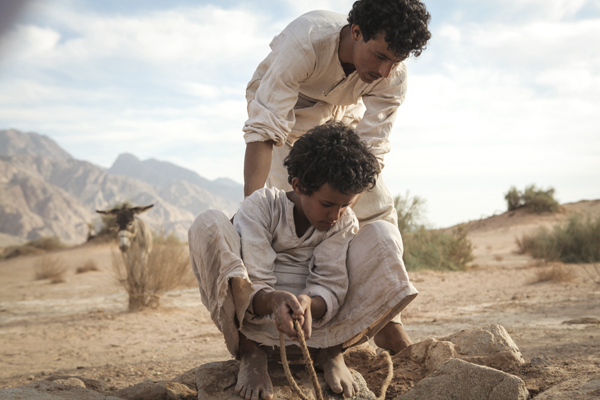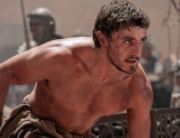![]() Set amid the stark beauty of the Jordanian Desert, director Naji Abu Nowar’s noteworthy debut film is a coming-of-age story steeped in Bedouin culture and the events of 1916. World War I is raging, and the Ottoman Empire is in a state of upheaval. Arab factions wage a revolution, and Great Britain defends its rights to the Suez Canal against the Turks, as well as attempting to further its influence in the region.
Set amid the stark beauty of the Jordanian Desert, director Naji Abu Nowar’s noteworthy debut film is a coming-of-age story steeped in Bedouin culture and the events of 1916. World War I is raging, and the Ottoman Empire is in a state of upheaval. Arab factions wage a revolution, and Great Britain defends its rights to the Suez Canal against the Turks, as well as attempting to further its influence in the region.
Caught in the crossfire are the independent Bedouin tribes. Their traditional way of life, born out of the necessities of survival in such a harsh environment, can have deadly consequences when faced with the encroaching war. According to Nowar, “In Bedouin law, if a stranger arrives at your tent requesting refuge, you must grant him protection until the threat can be peacefully resolved. This is known as the law of Dakheel, and it is considered a sacred duty for a host to protect his Dakheel, no matter what the circumstance.”
Hussein (Hussein Salameh) has taken over the responsibility for raising his young brother, Theeb (Jacir Eid), since the recent death of their father. Theeb (which means wolf in Arabic) acts like Hussein’s shadow, following him everywhere, anxious to learn the ways of the adults, but still possessing a child’s impetuosity. When Hussein agrees to escort a British Army officer (Jack Fox) and his guide to the well that lies along a dangerous route, Theeb secretly follows in their wake. He waits until they’ve gone too far to turn back before announcing his presence, then hitches a ride with Hussein on his camel.
The British officer carries with him a mysterious box that no one is allowed to touch. For Theeb, it’s an irresistible temptation, compelling and foreboding. It also proves to be a magnet for a band of outcast Bedouin thieves who come armed with rifles to obtain the box for the Turks. Following a deadly skirmish, Theeb winds up alone with one of the badly wounded assailants (Hassan Mutlag). Theeb wavers between his desire for revenge and his honor bound duty to help the man who very likely offers his best chance for survival.
The intimate story is told through the eyes of Theeb, effectively capturing his frustration and confusion over the unexplained actions of the adults around him, as well as his naïve bravery that overcomes fear despite the odds against him. His tendency toward incorrigibility ultimately works in his favor.
Nowar’s choice to use native Bedouins rather than professional actors (with the exception of Fox) gives the story a convincing authenticity. Both Eid and Mutlag are naturals. The dialog is remarkably spare, allowing the evocative plot to gradually unfold on a mostly visual level, and Wolfgang Thaler’s mesmerizing cinematography is visceral in its impact. Belying the alluring beauty and soft pastel palette of sand and sky, Thaler’s sweeping desert scenes emphasize the fragile and temporary nature of humanity. Rocky outcroppings become sinister giants concealing ill intent, and life giving water wells become deadly traps. Yet every scene enthralls with its beguiling juxtaposition of the characters, particularly the young Theeb, and the vast landscape.
A beautiful and haunting film to be savored again and again.







Leave A Comment